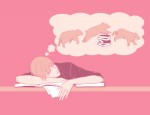Most people spend over a third of their lives in slumber, but don’t understand the mechanics or the significance of the process. Daily Bruin Radio investigates how to get better sleep, what is the ideal amount sleep and why sleep is necessary.
TRANSCRIPT:
“Everyone’s always tired, but you know if you had to choose between a good sleep every night and a good GPA, I think most people would take the GPA”
“Last quarter I got three to four hours of sleep because I had three 8 AM finals, I had to wake up early to study, and I had to stay up late to study…
Ma: For many students here at UCLA, a good night’s sleep is a luxury that cannot be afforded. Between completing schoolwork, working a job or participating in club activities, students often deprive themselves of adequate rest, especially during midterms and finals week. When students forgo healthy sleep habits, the brain’s learning and memory capabilities drastically decrease along with personal health. At this year’s Sleep Symposium, multiple speakers presented on the necessity of sleep in maintaining a healthy lifestyle.
Colwell: You have to set aside time for it, and if you don’t, you’ll actually do worse on your tests.
Ma: That was Dr. Christopher Colwell, head of the UCLA Laboratory of Circadian and Sleep Medicine. Founded by the Healthy Campus Initiative, the Sleep Symposium invited various sleep experts to present on issues such as how much sleep students need and how students can get better sleep. According to Dr. Colwell, the average individual currently sleeps only six hours each night, or at least one hour less than needed.
Colwell: On avyerage, most people need seven and a half to eight hours of sleep a night in order to perform optimally. Meaning that you can actually take a person and put them in a lab on a night they’ve only had six hours of sleep, and you can document that their performance, their ability to learn and remember is decreased.
Ma: To solve this problem of sleep deprivation, Dr. Alon Avidan, head of the UCLA Sleep Disorders Center, recommends afternoon naps to boost your cognitive function.
Avidan: The strategic naps are best and the most ideal between 1 to 3 p.m., so it would be most ideal to take the nap when our ability or physiological need for sleep is the greatest.
Ma: However, lack of sleep is not the only problem. Ever have trouble falling asleep, or waking up after a long night’s rest still feeling groggy? This is because quality of sleep significantly suffers due to poor sleeping habits, or sleep hygiene.
Colwell: One classic example of this is the importance of lighting. Your biological clock that you have in your brain that controls the timing of when you go to sleep and when you wake up in the morning is synchronized by light, especially the blue and green wavelength light. Many students in the day spend time under fluorescent lighting. Fluorescent lighting does not have many blue wavelength light and at night; they play video games or are on tablets, which do emit blue and green wavelength light. What happens is that your biological clock follows the lighting cues, so you can’t sleep at night.
Ma: When students deprive themselves of sleep and practice poor sleep hygiene, many health problems can arise, including short term effects such as poorer cognitive function and fatigue, and long term effects such as a higher risk for Type 2 diabetes and immune dysfunction. Dr. Colwell explains that sleep not only keeps the body healthy, but also surprisingly serves as a tool to consolidate memory and reinforce what you studied throughout the day.
Colwell: Sleep is the time when memories get processed. You’ve learned all this stuff during the day. Some of this stuff you have to forget. There are many things that you don’t want to remember, and there’s some things that you need to remember for the next day. Some things get stored as long term memories, some things get thrown out.
Ma: After the symposium, MindFul Music, a student-led classical music group, performs as students ask questions and discuss issues raised during the presentations. Students sought to reform their lifestyles by becoming aware of the significance of proper sleep habits.
“I thought it was really interesting talking about the different things that affect sleep, like reasons why college students in particular aren’t getting enough sleep and ways to help with that problem.”
“I used to use my phone a lot in bed, and I think that’s the biggest change I’ll make.”
“I’m going to try to incorporate more mindfulness into my sleep habits, and look for more resources to better fall asleep.”
Ma: Clearly, adequate sleep is vital, regardless of how busy a student is. So next time, when you feel a bit tired after hours of studying or work, take a short nap. Your body and grades will thank you for it later. For Daily Bruin Radio, this is Austin Ma.
